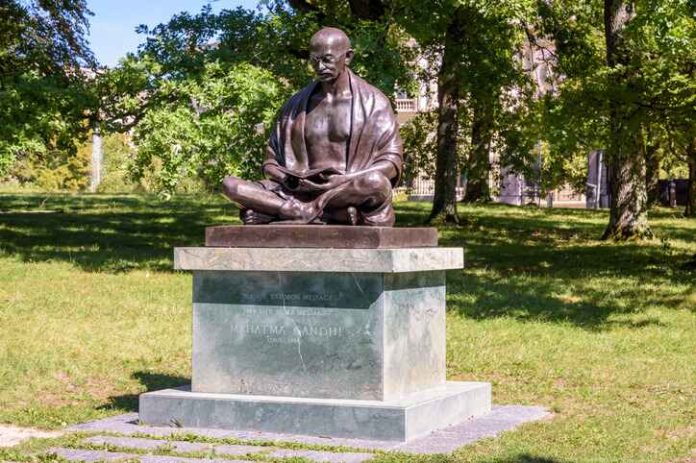The purpose of this paper is to explore a new leadership style — “soft leadership” – which is needed in an interconnected, global, and technocratic world. It is a combination of research into a new leadership style with a question and answer session during an International Leadership Association (ILA) webinar. It discovers how the soft leaders adopt tools such as influence, persuasion, negotiation, appreciation, motivation, and collaboration for the collective good. It explains how soft leadership is different from other leadership styles. It describes the significance of soft leadership and differentiates between soft and hard leadership through examples. It calls upon readers to consider how leadership insights acquired from this manuscript may be applied individually and organizationally to make a difference in the lives of others. It concludes that Mahatma Gandhi’s impact on humankind is eternal and his ideals and ideas are immortal.
“Power is of two kinds. One is obtained by the fear of punishment and the other by acts of love. Power based on love is a thousand times more effective and permanent than the one derived from fear of punishment.” —Mahatma Gandhi
I led a webinar on “Soft Leadership: A New Leadership Perspective” organized by the International Leadership Association on August 29, 2012. When I explained my new leadership concept — soft leadership, and the soft leaders who must contain 11 C’s one of the participants asked a question, “Is there any leader in the world who possesses all C’s?” I replied, “Yes, there was one leader who had all the 11C’s such as character, charisma, conscience, conviction, courage, communication, compassion, commitment, consistency, consideration, and contribution — that was Mahatma Gandhi. He shook the mighty British Empire and got independence for India through truth and non-violence. He said, “In a gentle way, you can shake the world.” He proved that a leader can achieve everything through moral power, soft power, soft tactics, and soft skills. He showed that it is not the size but strength that matters. It is not the physical strength but moral strength that counts. Mahatma Gandhi influenced the world through his soft leadership including six Nobel Laureates — Dr. Martin Luther King Jr., Nelson Mandela, Dalai Lama, Aung San Suu Kyi, Adolfo Perez Esquivel, and Barack Obama.
What is Soft Leadership?
Soft leadership is a new direction to leadership coined by me. We need this style with the changing times and technologies and due to the dynamic global business environment. This new leadership perspective is essential to meet the rising expectations of all stakeholders globally. Soft leadership can be defined as the process of setting goals; influencing people through persuasion; building strong teams; negotiating with them with a win-win attitude; respecting their failures; handholding them; motivating them constantly; aligning their energies and efforts; recognizing and appreciating their contribution in accomplishing the organizational objectives with an emphasis on soft skills. It is based on the right mindset, skill set, and toolset.
Soft Leaders and 11 Characteristics
“Christ gave us the goals and Mahatma Gandhi the tactics.” —Dr. Martin Luther King Jr.
Soft leaders are the leaders who make a difference in the lives of their partners. They don’t believe in leadership and followership but in partnership. They blend hard and soft skills and lead from the front with 11 characteristics. They adopt various tools such as participation, persuasion, influence, negotiation, motivation, recognition, appreciation, and collaboration. They adopt soft power, soft tactics, and soft tools and techniques to get the tasks executed successfully. They are more people-orientation rather than task-orientation and adopt a transformational style rather than a transactional style. Precisely, soft leaders are relationship-oriented, people-orientated, service-oriented, transformational, authentic, and thought leaders who lead through soft skills. Here are the 11 characteristics that substantiate that Mahatma Gandhi was a great soft leader:
Character
Character is one of the key components of soft leaders. It is through their strong character they lead their people by influencing and guiding them. Character is the key thing that differentiates good leaders from others. Good character makes a person a great leader. What counts at the end of the day in your life is who you are, not what you have. Mahatma Gandhi was a great example of a character who practiced what he preached. He walked his talk throughout his life. He enlightened, “The Roots of Violence: Wealth without work, Pleasure without conscience, Knowledge without character, Commerce without morality, Science without humanity, Worship without sacrifice, Politics without principles”
Charisma
Mahatma Gandhi differentiated, “Power is of two kinds. One is obtained by the fear of punishment and the other by acts of love. Power based on love is a thousand times more effective and permanent than the one derived from fear of punishment.” One of the greatest characteristics of soft leaders is their charisma. Charisma helps in connecting with others easily as people feel valued and pleased to talk with these leaders. Mahatma was a charismatic leader. He succeeded as a soft leader because of his ability to control mystical inner power. He connected with the common man with his charisma. He strongly believed, “An ounce of practice is worth more than tons of preaching.”
Conscience
Conscience is one of the major key components of soft leaders as a clear conscience makes them stand out from other leaders. People expect leaders to be ethical and responsible. They also look up to leaders whose conscience cares for them. Conscience differentiates the right from the wrong. Leaders must have a clear conscience to convince themselves so that they can persuade others. If there is a chasm between the word and the deed, conscience remains the same. Mahatma Gandhi was always clear with his conscience. He unveiled the mistakes he made in his autography — “Gandhi An Autobiography: The Story of My Experiments With Truth”. Every person makes mistakes but how many unveil and admit them? It requires a lot of courage to reveal one’s wrong-doings. He rightly said, “The human voice can never reach the distance that is covered by the still small voice of conscience.”
Conviction
Mahatma Gandhi asserted, “You can chain me, you can torture me, you can even destroy this body, but you will never imprison my mind.” Conviction is another key ingredient for soft leadership without which the soft leaders cannot lead successfully. It is their convictions that take soft leaders forward and inspire their people to move forward toward achieving their goals. Mahatma Gandhi was a symbol of sacrifice and conviction. He said, “A ‘No’ uttered from the deepest conviction is better than a ‘Yes’ merely uttered to please, or worse, to avoid trouble.” During India’s independence, he was subjected to several hardships but he strongly believed in his convictions. Hence, Mahatma Gandhi was an apt example of conviction.
Courage
Mahatma Gandhi said, “The weak can never forgive. Forgiveness is the attribute of the strong.” Courage is an integral part of soft leadership. Courage doesn’t mean fighting with others physically. Courage means standing for your principles policies, values, and ethics. Mahatma Gandhi remarked, “Strength does not come from physical capacity. It comes from an indomitable will.” He stood for his values of non-violence and Satyagraha. Remember what counts at the end of the day is neither your muscle power nor money power but your moral power. Hence, Mahatma Gandhi was a great example of courageous leadership and soft leadership.
Communication
Leaders express their ideas, ideals, and insights and persuade others to follow them through communication skills. And soft leaders adopt assertive communication. Assertive communication is the ability to communicate firmly but politely. Mahatma Gandhi was a great communicator who never compromised with his principles but expressed them politely and adopted them firmly. He communicated with the people through practice and by setting an example. He communicated in the language the people understood and not in the language he knew. He said, “I have nothing new to teach the world. Truth and Non-violence are as old as the hills. All I have done is to try experiments in both on as vast a scale as I could.”
Compassion
When we refer to compassion, two leaders flash in our minds — Mahatma Gandhi and Mother Teresa. Mahatma Gandhi was a compassionate leader whose heart was filled with tons of compassion. He empathized with the people of all religions and faiths and respected them. He was an empathic leader who could step into the shoes of others and understand things from others’ perspectives. Once he was traveling in a train, and he was standing at the door enjoying the beautiful scenery of India. One of his chappals slipped away and fell from the train. He threw the other chappal as well so that the finder could benefit as he would have a pair instead of just one chappal. Keeping one chappal with him would be of no use to him or the finder. It shows his empathy and compassion. Mahatma Gandhi moved with untouchables and gave them due respect. He said, “Compassion is a muscle that gets stronger with use.” Compassion is an integral characteristic of soft leadership. Compassion differentiates soft leaders from other leaders. It helps connect with others easily. People appreciate the leaders who care and touch them.
Commitment
Commitment is the key characteristic of soft leaders. Mahatma Gandhi was committed to truth, non-violence, and peace. He rightly remarked, “My commitment is to truth not consistency.” He believed in simplicity and humility. He was committed to fighting against inequality and injustice when he was in South Africa and India. He was committed to fighting against suppression and oppression. He was committed to Hindu-Muslim unity. He once remarked, “I don’t have a message. My message is my life.” His commitment to the cause of India’s freedom was firm. As a result, he made a significant difference in the lives of Indians.
Consistency
Consistency is another important ingredient for soft leadership. Leaders need to demonstrate their consistency to have a profound impact on their people. People expect leaders to be predictable, responsible, and credible. Failure to demonstrate consistency might lead to a credibility crisis. Mahatma Gandhi maintained consistency throughout his life by sticking to non-violence and peace. He remarked, “True morality consists, not in following the beaten track, but in finding out the true path for ourselves and in fearlessly following it.” Consistency is essential in every area of life. Consistency is essential in putting your efforts to achieve big. It is required to get noticed as a credible and responsible person.
Consideration
Consideration is one of the major characteristics of soft leaders as soft leaders care for their people. Consideration means how much and how far the leaders are sensitive towards their people. Leaders with consideration have more orientation rather than task orientation. They empathize with others and understand their problems. Mahatma Gandhi was an empathetic leader who always cared for and considered others. He said, “I don’t believe in stereotypes, I prefer to hate people on a more personal basis. The measure of a truly great man is the courtesy with which he treats lesser men. An eye for an eye will make the whole world go blind.”
Contribution
Contribution includes precious time, money, energy, ideas, knowledge, and service to society. Genuine and selfless contribution takes to true leadership. People respect the leaders who contribute their best to society without hankering for wealth, power, or prestige. Mahatma Gandhi said, “We must become the change we want to see in the world.” His contribution to India’s freedom movement, and to bring a qualitative difference in the lives of others is unquestionable. He enlightened the world with the knowledge that all religions in the world share common beliefs of truth and non-violence which is his major contribution to mankind. Here is the diagram connecting all 11C’s that constitute soft leadership and symbolize the characteristics of Mahatma Gandhi:
Mahatma Gandhi — A Soft Leader
Mahatma Gandhi said, “Truth and non-violence are as old as the hills. All I have done is to try experiments in both on as vast a scale as I could. In doing so, I have sometimes erred and learned from my errors. Life and its problems have thus become to me so many experiments in the practice of truth and nonviolence.”
Mahatma Gandhi had more concern for people and was a participative, and relationship-oriented leader. Commenting on leadership he quoted, “I suppose leadership at one time meant muscles, but today it means getting along with people.” It clearly shows that his leadership style is closely connected with soft leadership. He provided a soft touch, believed in soft power, adopted soft tactics, and applied soft skills apart from possessing the 11 characteristics needed for a soft leader. Hence, we can conclude that Mahatma Gandhi was an ideal example of a soft leader. His principles are eternal and his leadership is everlasting.
Mahatma Gandhi is Mortal and his Philosophy is Immortal
After the assassination of Gandhi, many people opined that Gandhi would be forgotten soon and his ideologies would fade away quickly. However, Gandhi and Gandhism still live in the hearts and minds of not only Indians but also people across the world. When several international political leaders including Julius Nyerere of Tanzania, Nelson Mandela and Steve Biko of South Africa, Lech Wałęsa of Poland, and Aung San Suu Kyi of Myanmar followed, it is obvious that Gandhi’s philosophy is relevant even after many years of his death. Additionally, some leaders followed him irrespective of their religions and nationalities including Khan Abdul Ghaffar Khan, Horace Alexander, Martin Luther King Jr, and Herman Kallenbach.
Gandhi was a soft leader who spent his entire life serving people to bring freedom to India. He underwent innumerable trials and tribulations during his lifetime by spending his time in jail. He dedicated his life to the cause of India’s independence. He became a symbol of love with a servant’s heart. He emphasized the dignity of labor and wanted to put an end to untouchability. He is an example for all of us to lead from the front with simplicity and humility. He was a transformational leader and servant leader. Above all, he was a soft leader. As leadership is not a popularity contest and is a job with a responsibility involving both bouquets and brickbats, he received both praise and criticism during his lifetime.
Mahatma Gandhi was politically formidable, combining an appeal to reason and evidence with an instinct for symbolic actions that would rally the Indian masses behind him. Mahatma Gandhi followed the principles of truth, non-violence, vegetarianism, spiritualism, religiousness, honesty, discipline, loyalty, aspiration, and practical purity. His principles of truth, non-violence, self-sufficiency (Swabalambi), universal upliftment (Sarvodaya), and peaceful protests are still relevant today. His principle of ‘hear no evil; speak no evil; and see no evil’ is relevant forever. Although some of his ideals are irrelevant, his core ideas remain relevant in today’s world.
Conclusion
“Generations to come, it may well be, will scarce believe that such a man as this one ever in flesh and blood walked upon this Earth.” ―Albert Einstein
Mahatma Gandhi continues to inspire people internationally through his soft leadership. He will be remembered as long as civilization exists. The present world needs another soft leader like Mahatma Gandhi to preach and practice non-violence and peace to eliminate intolerance and impatience, and to spread universal brotherhood and fraternity.
About the Author
 Professor M.S. Rao, Ph.D. is the Father of “Soft Leadership” and the Founder of MSR Leadership Consultants, India. He is an International Leadership Guru with forty-three years of experience and the author of fifty-two books including the award-winning ‘See the Light in You’ URL: https://www.amazon.com/See-Light-You-Spiritual-Mindfulness/dp/1949003132. He has published over 300 papers and articles in prestigious international publications including Leader to Leader, Thunderbird International Business Review, Strategic HR Review, Development and Learning in Organizations, Industrial and Commercial Training, On the Horizon, and Entrepreneur magazine. He is a soldier, entrepreneur, editor, educator, author, enlightener, and philosopher. He is a C-Suite advisor and global keynote speaker. He brings a strategic eye and long-range vision given his multifaceted professional experience including military, teaching, training, research, consultancy, and philosophy. He is passionate about serving and making a difference in the lives of others. He trains a new generation of leaders through leadership education and publications. His vision is to build one million students as global leaders by 2030 URL: http://professormsraovision2030.blogspot.com/2014/12/professor-m-s-raos-vision-2030-one_31.html. He advocates gender equality globally (#HeForShe). He invests his time in authoring books and blogging on executive education, learning, and leadership. Most of his work is available free of charge on his four blogs including http://professormsraovision2030.blogspot.com. He is a prolific author and a dynamic, energetic, and inspirational leadership speaker. He can be reached at msrlctrg@gmail.com.
Professor M.S. Rao, Ph.D. is the Father of “Soft Leadership” and the Founder of MSR Leadership Consultants, India. He is an International Leadership Guru with forty-three years of experience and the author of fifty-two books including the award-winning ‘See the Light in You’ URL: https://www.amazon.com/See-Light-You-Spiritual-Mindfulness/dp/1949003132. He has published over 300 papers and articles in prestigious international publications including Leader to Leader, Thunderbird International Business Review, Strategic HR Review, Development and Learning in Organizations, Industrial and Commercial Training, On the Horizon, and Entrepreneur magazine. He is a soldier, entrepreneur, editor, educator, author, enlightener, and philosopher. He is a C-Suite advisor and global keynote speaker. He brings a strategic eye and long-range vision given his multifaceted professional experience including military, teaching, training, research, consultancy, and philosophy. He is passionate about serving and making a difference in the lives of others. He trains a new generation of leaders through leadership education and publications. His vision is to build one million students as global leaders by 2030 URL: http://professormsraovision2030.blogspot.com/2014/12/professor-m-s-raos-vision-2030-one_31.html. He advocates gender equality globally (#HeForShe). He invests his time in authoring books and blogging on executive education, learning, and leadership. Most of his work is available free of charge on his four blogs including http://professormsraovision2030.blogspot.com. He is a prolific author and a dynamic, energetic, and inspirational leadership speaker. He can be reached at msrlctrg@gmail.com.
References
- https://www.amazon.com/Soft-Leadership-New-Direction/dp/1949003523
- https://www.emerald.com/insight/content/doi/10.1108/00197851311320559/full/html
- https://www.emerald.com/insight/content/doi/10.1108/DLO-05-2017-0051/full/html
- https://scholar.valpo.edu/jvbl/vol10/iss1/9/
- http://www.ila-net.org/Webinars/Archive/Rao082012.html
- https://poetsandquants.com/2022/05/14/m-s-rao-father-of-soft-leadership-b-schools-must-reinvent-with-the-rapidly-changing-times/
- https://www.druckerforum.org/retrospective/2016/dialoguereview.com/gandhi-principle-five-myths-soft-leadership/index.html


































